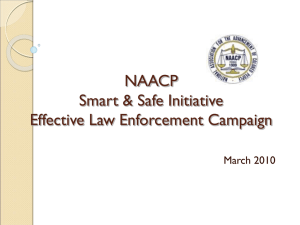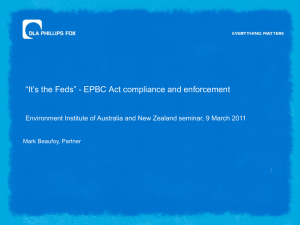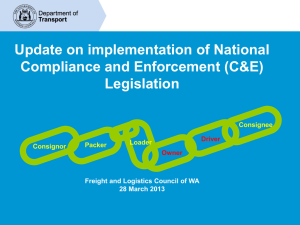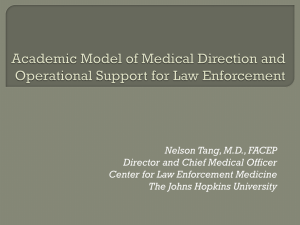Department of Sustainability, Environment, Water, Population and
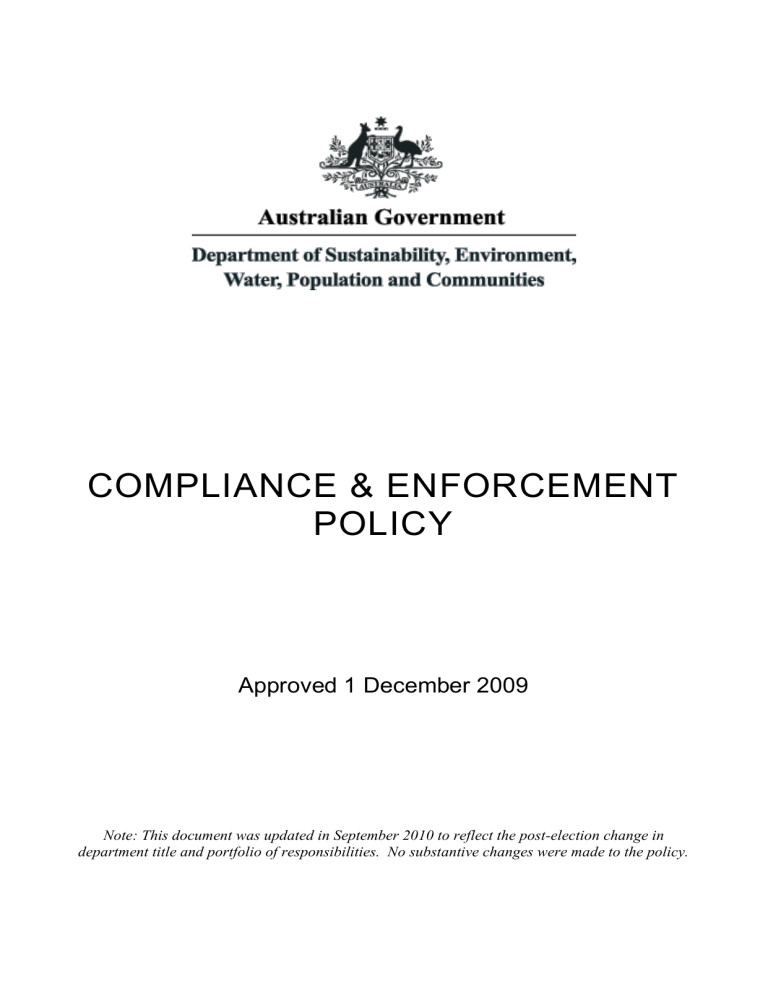
COMPLIANCE & ENFORCEMENT
POLICY
Approved 1 December 2009
Note: This document was updated in September 2010 to reflect the post-election change in department title and portfolio of responsibilities. No substantive changes were made to the policy.
Department of Sustainability, Environment, Water,
Population and Communities
Compliance & Enforcement Policy
Contents
D I SC L O S U R E O F I N F O R M AT I O N O N C O M P L I A N C E A N D EN F O R C E M EN T
Australian Government - Department of Sustainability, Environment, Water, Population and Communities Page 1/12
Compliance & Enforcement Policy
1. Introduction
The Australian Government Department of Sustainability, Environment,
Water, Population and Communities (the department) administers a variety of Australian Government legislation and programs. The legislation encompasses a variety of statutory regimes containing a range of criminal and civil penalty provisions and civil and administrative remedies.
The purpose of this policy is to describe the principles used by the department when addressing possible contraventions of its legislation.
The policy describes the factors taken into account in determining appropriate responses to contraventions, including whether or not legal proceedings wil l be pursued. The department’s approach and procedures for individual cases may vary where there are specific legislative requirements.
This policy sits within the broader Australian Government law enforcement policy context and is informed by:
The Prosecution Policy of the Commonwealth , and
Commonwealth Fraud Control Guidelines
Directives and guidelines issued by the AttorneyGeneral’s
Department, including:
Legal Services Directions - a set of binding rules about the performance of legal work for the Commonwealth
Overarching Principles for Selecting Cases for Investigation and
Administrative, Civil and Criminal Sanctions
A Guide to Framing Commonwealth Offences, Civil Penalties and
Enforcement Powers (December 2007)
Australian Government Investigations Standards
Australian National Audit Office (ANAO) Better Practice Guide
Administering Regulation (March 2007)
Commonwealth Ombudsman, Better Practice Guide to Complaint
Handling (April 2009)
Relevant legislative obligations relating to security, privacy and freedom of information, and
Emerging case law and other legal developments.
The department regularly reviews its compliance and enforcement policy and procedures, and incorporates lessons learned into its policies, procedures and the legislative process itself.
Australian Government - Department of Sustainability, Environment, Water, Population and Communities Page 2
Compliance & Enforcement Policy
2. Objectives and guiding principles
The department’s compliance and enforcement policy seeks to:
maximise compliance with legislation
help achieve the objectives of legislation
promote and encourage the protection of the environment, and
provide a credible and effective guide for stakeholders and the wider community.
In the course of implementing this policy the department will:
ensure compliance and enforcement activities are undertaken in a manner which is:
in accordance with the law
effective and proportionate
fair and impartial
respectful of individuals, and
within officers’ authority.
administer and enforce its legislation in a coherent, consistent and objective manner, and
conduct itself in accordance with the departmental Service Charter
(available on the departmental website).
Australian Government - Department of Sustainability, Environment, Water, Population and Communities Page 3
Compliance & Enforcement Policy
3. The department’s responsibilities
The department deals with matters arising under legislation administered by the Minister for Sustainability, Environment, Water, Population and
Communities. Of that legislation, the following Acts, or regulations and ordinances made under them, contain offence or penalty provisions:
Aboriginal and Torres Strait Islander Heritage Protection Act 1984
Antarctic Marine Living Resources Conservation Act 1981
Antarctic Treaty (Environment Protection) Act 1980
Australian Antarctic Territory Act 1954
Environment Protection and Biodiversity Conservation Act 1999
Environment Protection (Sea Dumping) Act 1981
Fuel Quality Standards Act 2000
Hazardous Waste (Regulation of Exports and Imports) Act 1989
Heard Island and McDonald Islands Act 1953
Historic Shipwrecks Act 1976
National Environment Protection Measures (Implementation) Act 1998
Ozone Protection and Synthetic Greenhouse Gas Management Act 1989
Sea Installations Act 1987
Water Act 2007
Water Efficiency Labelling and Standards Act 2005
Further information about compliance and enforcement aspects of these
Acts can be obtained from the Department’s:
website at: http://www.environment.gov.au/index.html, or
Community Information Unit on 1800 803 772.
The department also undertakes compliance and enforcement in relation to its programs and responsibilities using other legislation, for example where fraud, theft or other criminal activity may have occurred.
Australian Government - Department of Sustainability, Environment, Water, Population and Communities Page 4
Compliance & Enforcement Policy
4. Compliance and enforcement approach
The department recognises that a range of compliance and enforcement mechanisms are necessary to provide an effective and flexible regulatory system. This enables the most appropriate response to be chosen for a given issue or incident.
The department promotes self regulation and encourages the community to act in accordance with its administered legislation and programs through measures such as targeted communication and education activities, timely provision of information and advice, persuasion, cooperative assistance and collaboration.
These measures help to:
raise awareness of the benefits of complying with the legislation and program requirements, and the potential consequences of noncompliance
remove barriers to compliance (e.g. lack of knowledge regarding legislative or program requirements, or how to comply)
promote the objectives of the legislation and programs, and
overcome factors that encourage non-compliance (e.g. lack of public support for, or misunderstanding of, legislative or program objectives).
Where possible, the department engages with the regulated community, including industry sectors. The department also encourages industrywide codes that are complementary to our legislation and promote compliance.
Where these compliance approaches fail, enforcement mechanisms may be used. The department employs a range of enforcement sanctions to ensure the most appropriate response to breaches of its legislation or program requirements. Sanctions may include exclusion from programs, suspension or cancellation of permits, injunctions, remediation orders, pecuniary penalties (fines), and criminal prosecution.
The department works with partner agencies and co-regulators so as to ensure an appropriate whole-of-government approach is taken on compliance and enforcement matters.
Australian Government - Department of Sustainability, Environment, Water, Population and Communities Page 5
Compliance & Enforcement Policy
5. Detecting contraventions
The department monitors compliance with and detects contraventions of its administered legislation and programs by analysing information from sources such as the general public, industry, non-government organisations and other government agencies.
Monitoring activities may be strategic, targeted or random, and may consist of:
patrols
audits
sample collection
site visits and inspections
observations by departmental officers or other agencies, and
intelligence analysis of information, data and reports.
The department strives to constantly improve its capacity to detect and respond to contraventions and works with other agencies to enhance this capacity. Where appropriate (for example, where the department’s monitoring responsibilities overlap with those of other agencies), the department builds strategic partnerships. Information may be shared with other agencies where required or permitted by law.
The department recognises the value of information provided to it by the general public, and welcomes any details of suspected breaches of legislative and program requirements. Information received is handled on a confidential basis and assessed to determine whether further investigative action should be taken.
Where information is received from the general public the department may not be able to provide feedback, as information on specific compliance and enforcement activities will not normally be released to the public. Notwithstanding this limitation, the department will endeavour to respond to correspondence in accordance with its Service Charter, to the extent that confidentiality and privacy considerations permit.
Australian Government - Department of Sustainability, Environment, Water, Population and Communities Page 6
Compliance & Enforcement Policy
6.
Investigating contraventions
All reported or detected contraventions of departmental legislation or program requirements are subject to initial assessment to ascertain their priority for further compliance and enforcement action. Prioritisation is undertaken to ensure the department’s investigative resources are used in the most effective manner.
Initial assessment typically includes a preliminary examination and analysis of the report or allegation in order to decide the likelihood that a contravention has occurred, its seriousness and its probable consequences. If possible, the department will act to prevent a potential breach and discourage ongoing and future breaches.
Based on the outcome of initial assessment and the relevant provisions of legislation, the department will determine the appropriate level, if any, of further investigation or response. Depending on the results of the initial assessment, the department may:
elect to not pursue the matter further (having regard to its jurisdiction, priorities, and how best to achieve the objects of the legislation or program)
elect to not proceed with further investigative action, but take action to increase awareness and encourage compliance (such as use of educational material and engaging relevant stakeholder groups)
elect to not proceed with further investigative action, but implement a mid-range compliance response such as seizure of a prohibited item, or
proceed with further investigative action.
The department’s investigations aim to:
determine whether or not there has been a contravention of law
gather evidence which would be admissible in criminal prosecutions or civil proceedings, or which may facilitate appropriate administrative measures
improve controls to prevent contraventions
deter further or similar action
improve public confidence in the integrity of the regulatory system, and
achieve an appropriate outcome within a reasonable time and at reasonable cost, according to legislative requirements and the nature of the investigation.
In certain circumstances the department may choose to (or be required to) refer suspected contraventions to the Australian Federal Police or other enforcement agencies for investigation. During such investigations, the department provides support to the relevant investigating agencies on matters relating to administration of its legislation and programs. Any information shared with other investigating agencies will only be done so when required or permitted by law.
Australian Government - Department of Sustainability, Environment, Water, Population and Communities Page 7
Compliance & Enforcement Policy
7. Responding to contraventions
The department aims to use the most appropriate compliance and enforcement option in response to each contravention.
Responses range from education and/or warnings to deterrent sanctions such as exclusion from programs, suspension or cancellation of permits or approvals, injunctions, remediation orders, seizure of goods, pecuniary penalties (fines) and criminal prosecution.
In determining the appropriate response to a contravention of legislation or a program administered by the department, the department considers a number of factors including:
The nature and severity of the harm done
the seriousness of the harm caused by the contravention, both to other people and to the environment
the cost of the contravention to the Australian Government or general community, and
Australia’s obligations under relevant international agreements
The law
objectives of the legislation and the specific penalty provisions
legal precedents affecting the case
the precedent and/or deterrent value of specific responses
the standard of evidence collected, and
the time elapsed since the contravention
The integrity of the regulatory system
the prevalence of the type of contravention
the likely public concern about the seriousness of the contravention
the efficacy of the proposed response option, and
whether the proposed response will promote compliance, and engender confidence in the regulatory system.
Any aggravating or mitigating circumstances
the level of malice or culpability – whether or not the contravention was intentional, reckless, negligent, or a mistake
the apparent commercial value of the contravention
the history of prior contraventions under the same or similar legislation (excluding spent convictions)
the likelihood of the contravention continuing or being repeated
whether the matter was self-reported, and
the level of cooperation afforded the authorities.
Australian Government - Department of Sustainability, Environment, Water, Population and Communities Page 8
Compliance & Enforcement Policy
Responding to contraventions (continued)
Where legislation provides for a range of administrative, civil and/or criminal responses, the department will determine the most appropriate response based on the particular circumstances of the case.
The different types of responses used by the department are described in greater detail below.
7.1.
Administrative Measures
Where appropriate the department may pursue administrative measures or alternative dispute resolution (ADR) rather than court based legal remedies.
Administrative measures are those implemented by the department or the Minister that do not require court action. Failure to comply with the conditions of some types of administrative measures may result in the department subsequently taking court action.
The department uses administrative measures to respond in a manner which is flexible, in proportion, and appropriate to the contravention.
Administrative measures are typically less expensive to apply than court based measures, and often enable earlier resolution of the matter in question. Importantly, administrative measures lend themselves to achieving sound and timely environmental outcomes in the public interest.
Administrative measures may include:
cautions and educational messages
requiring a person to take a particular action
formal advisory or warning letters requiring future compliance
infringement notices
varying, or imposing further conditions on permits, licences or approvals
suspending, revoking or cancelling permits, licences or approvals
retaining bonds or securities lodged as a condition of permits, licences or approvals, to remediate any harm caused by a violation
directed audits
conservation or other agreements to compensate for the contravention or to prevent future contraventions
enforceable undertakings
Ministerial orders to correct a contravention, and
forfeiture of items (e.g. illegal specimens).
The subject of an administrative sanction may, in some cases, have a right of appeal depending on the type of sanction used.
Australian Government - Department of Sustainability, Environment, Water, Population and Communities Page 9
Compliance & Enforcement Policy
7.2. Civil Remedies
Some departmental legislation provides for a range of civil remedies, including civil penalty provisions.
A civil penalty provision is set out in a similar way to a criminal offence and is subject to proceedings in a court. Where the department has sufficient evidence that a civil penalty provision has been contravened (a
‘civil contravention’), it may pursue civil penalties.
Where legislation lists civil penalty provisions the civil penalty options available to the department are contained in the legislation itself.
Civil penalties do not result in imprisonment or criminal convictions.
However, civil pecuniary penalties (fines) contained in departmental legislation are typically of higher magnitude than those for the equivalent criminal offences. This reflects the need for economic deterrence to noncompliance, and the fact that civil penalties also seek to redress the harm done as a result of contraventions.
Civil penalties offer a number of advantages in the enforcement of environmental legislation:
they lend themselves to securing a sound environmental outcome in the public interest
they lend themselves to the sanctioning of organisations (e.g. bodies corporate) in addition to individuals, and
they are subject to a lower burden of proof than criminal prosecutions.
Other civil remedies which are available to the department include:
fines, to deter non-compliance with the legislation
injunctions, to prevent certain behaviour from being taken or continuing
court orders requiring certain actions to be taken, such as:
repair and mitigation of damage, or
actions necessary to conserve the environment on
Commonwealth land.
Civil actions initiated by the department/Minister are normally heard in the
Federal Court; however, they may also be heard in a Supreme Court of a
State or Territory if specified in the legislation providing for the civil remedy.
The process used to pursue civil actions closely follows the procedures used in private civil actions.
Civil action is undertaken on behalf of the department/Minister by a legal service provider acting on instructions from the department.
Australian Government - Department of Sustainability, Environment, Water, Population and Communities Page 10
Compliance & Enforcement Policy
7.3.
Criminal Penalties
Legislation for which the department has compliance and enforcement responsibilities typically contains criminal offences. A person found guilty of committing a criminal offence may receive:
a criminal record
a fine, and/or
imprisonment.
If the department considers criminal prosecution to be the most appropriate response to an alleged offence and sufficient evidence is gathered, it may prepare a brief of evidence. The brief may then be referred, at the department’s discretion, to the Commonwealth Director of
Public Prosecutions (CDPP), who has responsibility for prosecutions of offences against Australian Government law.
The department’s decision to refer a matter to the CDPP is informed by a number of considerations. The department is likely to favour a referral to the CDPP where any of the following circumstances occur:
The offence produced real or potential harm to the Australian
Government or the community, including harm to the environment, economy, resources, assets, or well being of Australia or Australians.
The Australian Government or the community expect that the offence will be dealt with by prosecution conducted in public before a court.
The offence is of such a nature or magnitude that is important to deter potential offenders and prosecution is likely to act as an effective deterrent.
Previous administrative or civil responses to contraventions by the suspect have not resulted in compliance.
If a matter is referred, the final decision on whether a prosecution is to be instituted or continued rests with the CDPP. The CDPP’s decision will be taken in accordance with the Prosecution Policy of the Commonwealth , which lists a number of criteria, including whether or not prosecution is in the public interest. In making its decision the CDPP takes into account the views expressed by the department on the issue.
The department has entered into a Memorandum of Understanding with the CDPP to govern the process by which criminal matters will be pursued.
Australian Government - Department of Sustainability, Environment, Water, Population and Communities Page 11
Compliance & Enforcement Policy
8. Disclosure of information on compliance and enforcement activities
Responses to information requests regarding general compliance and enfo rcement matters will be handled in accordance with the department’s
Service Charter (available on the departmental website), subject to any confidentiality obligations and the legislative requirements relating to information security and privacy. Media inquiries will be handled by departmental Public Affairs.
The department does not release information on specific compliance and enforcement activities, such as active investigations, to the public unless it is absolutely necessary or required by the investigative process (for example, to seek information from potential witnesses). Information may be shared with co-regulators for the purpose of law enforcement and subject to relevant information security and privacy provisions.
In particular, no comment will be made that may:
prejudice a person’s right to a fair hearing or legal process
impinge upon the privacy or safety of others involved in the investigation (such as complainants, witnesses and suspects), or
prejudice any past or future actions of the department.
Even after completion, the details of investigative activities will normally remain confidential. However, most court proceedings are open to the public. Additionally, the enforcement outcome may be publicised where appropriate (for example, in accordance with Section 498 of the
Environment Protection and Biodiversity Conservation Act 1999).
Requests for information relating to compliance or enforcement or matters made pursuant to the Freedom of Information Act 1982 (FOI Act) will be handled in accordance with the processes set out in the FOI Act.
Any decision to release or refuse to release information will be considered on a case-by-case basis in accordance with the provisions of the FOI Act.
Australian Government - Department of Sustainability, Environment, Water, Population and Communities Page 12

